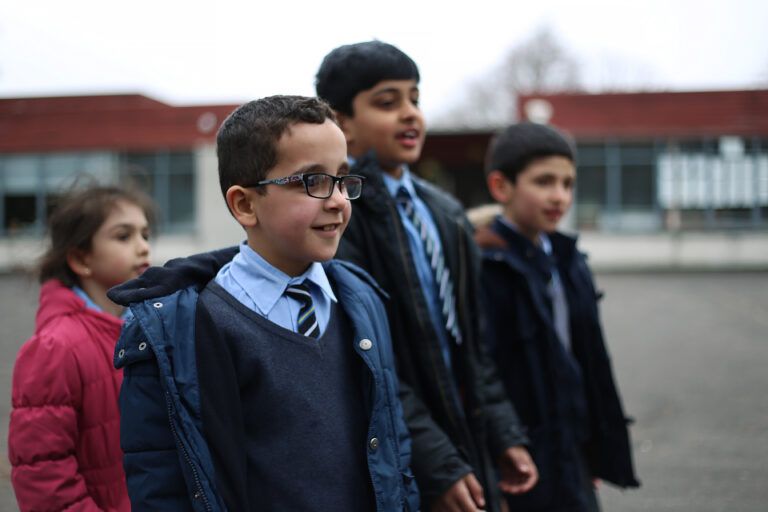Our project intended to provide specifically relevant books for individual young people on a weekly loan basis, widen the impact of successful approaches we developed during Covid-19 restrictions, support children’s reading through buddy-volunteers reading books with them virtually and include opportunities for people to join book groups online.
Glenburn Independent Baptist Church


The aim of the project was to support people being able to use their own voice in English; increase their individual sense of belonging in and to their new home. The changes we expected to see as people read more in English and became more familiar with and comfortable in their new cultural environment, was that that sense of belonging would become theirs.
Key Information
Geographical reach
East Renfrewshire, Glasgow, Renfrewshire
Dates
01/09/2021 – 30/11/2022
Target Groups
Refugees, Younger people,
Project Type
Supporting innovation
Background
This project is needed because families say it is needed. It is needed because increasing numbers of children say they want it. It is needed because, for individual children in refugee or asylum-seeking families, there is currently no other way to access such a range of immediately-available, high-quality, relevant texts, so quickly and at home.
The project is needed because, currently, many parents are learning English and, therefore, not yet in a position to provide their children with the kind of supported reading, and learning-at-home activities (in English) which research consistently identifies as giving children an advantage at school, and identifies a higher risk of under-achieving at school without it (Bradshaw et al, 2011).
Such support is also now needed to support children who have been unable to attend school for much of the past year, or have missed out on time at nursery, or have spent much of their very young lives at home.
Involvement of New Scots in project
The involvement of each individual participant – refugees and asylum-seekers – is crucial to the delivery of the project. They lead the direction in terms of topics and subjects for books, and with growing awareness of authors in English, they are central to the authors which they read.
The primary and secondary children frequently volunteer to join the volunteers on Friday deliveries every time schools are on holiday. This has made seasonal deliveries – Christmas, Easter, Summer and October – especially important as the children deliver the books at those times. They have the opportunity to meet new people, from different countries, and they get involved in packing and unpacking the books. This volunteering by the children has developed at their suggestion, and there is usually a waiting list of children who want to volunteer.
Our Library Admin Assistant is a very important voice in the team. She is also a participant, and very active in introducing and encouraging new participants. Her responses to books she reads are extremely important, and often highlight relevant books for specific adults.
The increasing number of adult participant-volunteers is also a reflection of the children volunteering, and the mothers who are at home are particularly keen to volunteer. The new location facilitates this and is actually a short walking distance from four of the families’ homes.
The new location of the library is now also ideal for meeting together as groups, and the children have recently enjoyed doing that, and chatting about and writing about their books together.
Impact
The children, families and adults do not want the project to stop and indeed want to become more involved, including by volunteering. The lasting impact may be the pleasure in reading, and the habit of reading which has become an ‘everyday’ activity for many participants.
A further impact has been that writing is also seen as ‘normal’, with many participants writing about what they read, and talking about it. 20 of the participating primary and secondary children wrote, illustrated and ‘published’ their own story books as part of the Refugee Festival Scotland in June 2022, and as part of our other project – GA-9553 Zooming Out – they have also worked with professional writers and taken part in Aye Write! and the Paisley Book Festival. These annual book events are now part of the calendars.
The project has continued beyond the funding period, being funded during November and December by the volunteers and donations, while applications were being submitted for other funding.

Challenges encountered
Time has been the most challenging aspect of the project.
The team of volunteers is small, and the time-commitment required is high. Spending time getting to know individual participants, and identifying their language levels, as well as interests, has been very demanding.
The management and organisation of the stock of books has required more and more time. Meeting all the requests for specific topics and/or authors has been a challenge.
Reflections
The key thing our organisation has learned from implementation of this project is to listen. Subsequently, acting on what is said is crucial. We have learned that individual voices are the most significant, while we have also learned that prioritising them is extremely time-consuming, but essential. If we were to do this again – and as we are continuing, we are in fact about to do this all again – we would try to increase the number of volunteers, and we will certainly gladly increase the role of volunteer-participants as they seek to join the team.
To other organisations seeking to do something similar, we recommend you have the biggest team of volunteers possible; that you are aware of the demands on time which come as part of a project like this; and that you do it!

